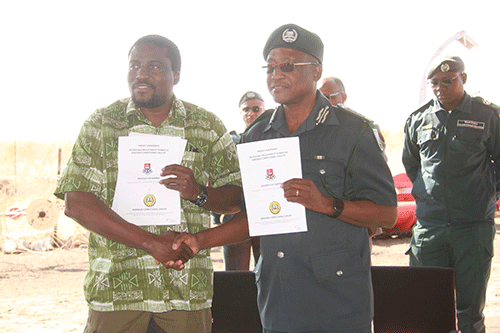In spite of the impact of climate change on the agricultural sector which causes recurrent droughts, and a rise in the costs of energy and food commodities, which ultimately affect livelihoods, food security in Namibia remains a national priority for government, vice president Nangolo Mbumba has said.
He made the remarks during the launch of Unam’s seed multiplication and wheat seed planting project at the Evaristus Shikongo correctional facility in Tsumeb on Tuesday.
Mbumba said in a speech read on his behalf that Namibia, in its National Development Plans, has prioritised increased productivity in agriculture, especially for smallholder farmers as game changers and key drivers in achieving inclusive, sustainable and equitable economic growth.
“Most of the Sustainable Development Goals namely, “no poverty, zero hunger, good health and well-being, and quality education’’ are intertwined with sustainable food production and food security, hence the importance of this event today,” he said.
Mbumba highlighted that the University of Namibia aims to become a high technology and innovation centre that interphase its research capacities, facilities, staff and students with industry and developmental partners to solve challenges, especially in the areas of agriculture and natural resources management and utilisation.
“I, therefore, applaud the efforts of the University of Namibia and the Namibian Agronomic Board in initiating the seed research project which will eventually lead to arresting hunger and complement our government’s national development efforts,” he said.
The Seed Research Project consists of two phases: Phase one focuses on research by planting various seeds and identifying high-yielding varieties based on the genetics of the seeds and environmental conditions.
Phase two focuses on seed multiplication on a large scale.
“Once, the two phases have been successfully completed, we expect to witness milestone improvements in the Namibian seed production industry,” he said.
Unam has embarked on the project in collaboration with the Namibian Correctional Services (NCS) to strengthen food diversity in correctional facilities and make the NCS farms centres of the production of quality seeds for Namibia that are drought tolerant and resistant to diseases.
Speaking at the same occasion, the NCS commissioner general Raphael Hamunyela said the collaboration will provide expertise, both in human capital and physical resources, including land, irrigation and infrastructure to manage and make sure that the project will reach its ultimate goal of reducing input cost.
According to him, it will increase food production to contribute to food security and build a sustainable farming system to build resilience.
“The Namibian Correctional Service has four production farms at Hardap, Evaristus Shikongo, Divundu and Oluno that are producing both crops and livestock products for offenders’ rations.
The sustenance and maintenance of this undertaking has been very costly and the geo-political commotion in Europe that has seen the prices of commodities sky-rocketing has impacted negatively on our farming operations,” said Hamunyela.
“We must embrace a holistic and person-centered approach, recognising that each individual in our care possesses the capacity for change and growth. By working together, we can create an environment that fosters personal development, offers hope, and promotes successful reintegration into society,” he noted.


